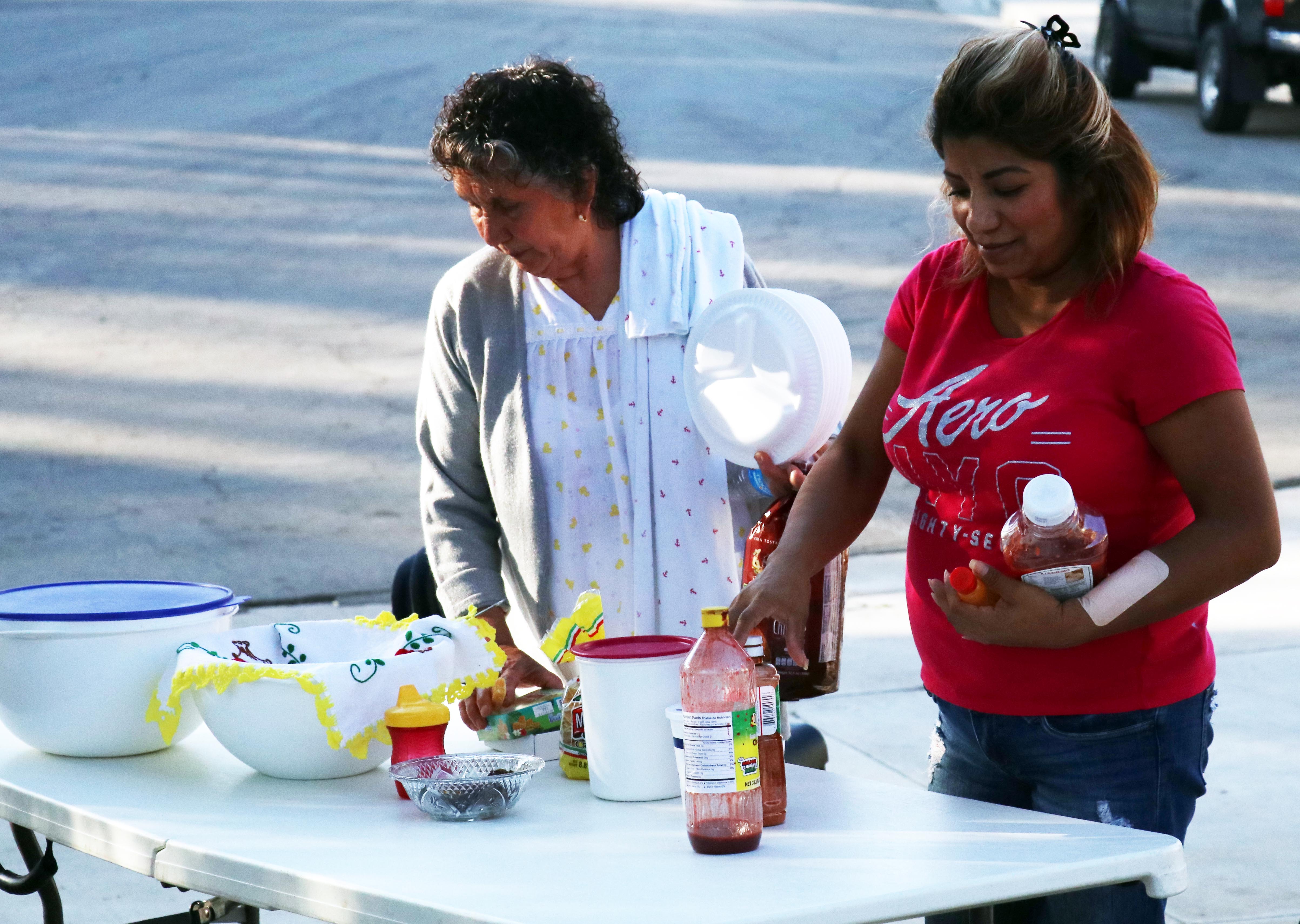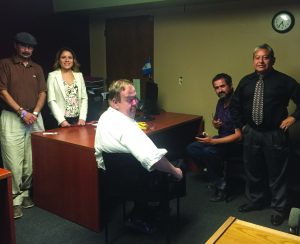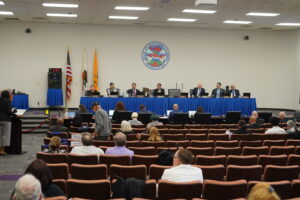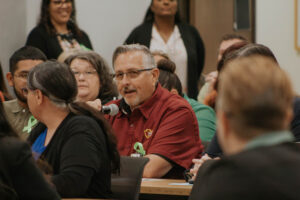Immigrants in Detention: A three part series
5 min read
Photo/Anthony Victoria: Minerva Chavez's (right) husband, Jhoanthan Vilmar Bernal Sanchez, was in detention for over two months. She was forced to sustain herself by selling off a family car and selling tamales from her home. Both Chavez and Sanchez have accumulated over $20,000 in debt due to bail and legal fees.
Jhoanthan Vilmar Bernal Sanchez was giving his brother’s friend a ride back from San Diego when they were apprehended by Border Patrol on the Interstate 8 freeway on March 7.
The 29-year-old native of Sinaloa, Mexico said he was transported to the U.S. Customs and Border Patrol (CBP) office in Imperial Beach, and subsequently handed over to Immigration and Customs Enforcement (ICE). By March 16, Sanchez was at the Adelanto Detention Facility’s housing unit ‘West 5 Bravo’–among the approximate 1,900 detainees held for offenses ranging from illegal entry to more severe criminal offenses.
He said he was never given an explanation as to why he was arrested. “They [CBP] never told me their motives. Next thing you know, my hands were up, I was asked questions about my residency status, and at the end, my car was towed.”
Back at home in Moreno Valley, his wife Minerva Chavez, 38–a mother of five children–became worried of her husband’s fate. Undergoing dialysis for a failed kidney, Chavez is unable to work; Jhoanthan’s detention made things more difficult.
“We always see these things on the news,” Chavez said. “It’s very different when one goes through it themselves.”
In debt due to bail and legal fees, Sanchez and Chavez sought help from Emilio Amaya, a Board of Immigration Appeals Accredited representative who also serves as the executive director of the San Bernardino Community Service Center. Through Amaya, Sanchez and Chavez received information on legal resources and financial support through fundraising efforts. It provided them with some hope.
“I thought of leaving,” exclaimed Sanchez. “It was too much to be in there for a long time. But I know I’ll make it.”
Legal challenges contributes to disarray among immigrant families
Some immigrants like Sanchez and Chavez do not have the appropriate resources to navigate through legal proceedings. According to the Community Initiatives for Visiting Immigrants in Confinement (CIVIC) Executive Director Christina Fialho, 84 percent of detainees lack legal representation.
“Our immigration detention system is supposedly a civil form of confinement,” said Fialho. “People don’t have the safeguards of the criminal justice system, such as the right to a court-appointed attorney or access to free phone calls. There isn’t that same level of due process or counsel, which are America’s most- treasured ideals.”
As a result, many detainees struggle to present lawful explanations that may help their cause.
Sanchez was facing possible deportation if no action was taken on his case by May 25. His previously-hired attorney failed to be prepared in time to provide legal counsel during a court hearing on April 13–causing a delay and prolonging his detention.
“Our former attorney simply wasted our time,” explained Sanchez. “He didn’t help us with anything.”
Fortunately for Sanchez, he received an extension, while seeking another lawyer. However, his court date was again postponed due to a Chickenpox outbreak at the Adelanto facility on April 19. After several postponements, he posted bail on May 5 and was released from detention on May 16. His fees currently stand at an approximate $21,000.

“It’s a very complicated system,” Sanchez surmised.
Forced to sell tamales out of her home and sell her car, Chavez made it clear she was willing to do whatever possible to ensure her husband was released. “There was no one present to sustain the household. For a while, we were sustaining ourselves with his tax return.”
Amaya affirmed that the majority of the people detained in Adelanto are men who are the heads of their households. He believes the disintegration of families–caused by the detention of immigrants–only puts more responsibility on the taxpayer.
“Families have to go to extreme measures,” Amaya said. “One of the consequences of prolonged detention is the lack of income families attain. As a result, we all end up paying for the problem. If these people are forced to receive public assistance, that’s a burden on us taxpayers, which frankly could be avoided if we stopped incarcerating immigrants.”
Immigration Attorney Russell Jauregui, who has his own practice in Colton, said separation causes psychological and emotional distress for families.
“If the person detained is a [parent], the children suffer,” he said. “They’re used to being bundled with their parents. This is something that really hurts our communities.”
We the People Rising Executive Director Robin Hvidston believes the issue of detaining immigrants is one of public safety. While she agrees that detainees should be given humane treatment, those with criminal ties and immigrants apprehended at or near the border should be placed in confinement until they are deported.
“If a person is in ICE custody, it means they have committed offenses on U.S. soil,” Hvidston said. “I do believe this is a public safety issue. Our community is protected by having these people in custody.”
Hvidston made it clear that the process for obtaining U.S. citizenship is complex and arduous, but beneficial in the long term.
“We are not against immigration,” she said. “What we oppose is people breaking our laws. The actual law says to enter the U.S. legally and reside in our country legally. The process may be prolonged, but it’s worth it.”
Groups, leaders hoping to shut down Adelanto and other detention centers
Senator Ricardo Lara (D-Bell Gardens) has introduced a bill that will prohibit corporations from establishing immigration detention centers across the state. If approved by both legislative houses, it will require for other facilities to uphold ICE’s Operations Performance Based National Detention Standards that gives guidance on the basic health and safety procedures that should be upheld. Moreover, it will allow detainees to file civil actions against the facility’s operator if their rights are violated.
“Since 2003 there have been over 100 deaths in these facilities,” the bill states. “While there are federal detention standards meant to govern the care and treatment of immigrant detainees, these standards are not legally enforceable and there is little to no recourse if they are violated.”
According to CIVIC Independent Monitoring and Policy Advocate Victoria Mena, private detention centers in the state, such as the GEO Group Inc. operated Adelanto and Mesa Verde Detention Facilities, could be permanently closed as a result.
“This will be a huge victory for us,” Mena said. “We could see through the behaviors at
Adelanto that there is a lot of neglect. Moving forward I think we should begin to see some justice.”
GEO declined to comment.
ICE spokesperson Virginia Kice explained that the federal agency has a zero tolerance policy for any kind of abusive or inappropriate behavior in its facilities.
“The Department of Homeland Security Office of the Inspector General (DHS OIG) and ICE’s Office of Professional Responsibility investigate all allegations of abuse or other misconduct and take appropriate action when such allegations are substantiated,” she responded in a written statement. “The contact information is displayed throughout the agency’s offices and detention facilities.”
Amaya said he is in full support of Lara’s legislation.
“California is leading the way in showing the nation how to properly treat its immigrant population,” said Amaya. “We are fully opposed to having private detention centers in our state. They have only exacerbated issues in our community, at the benefit of others.”





